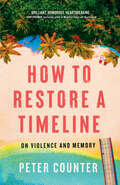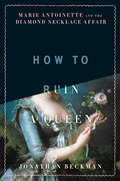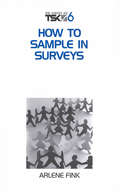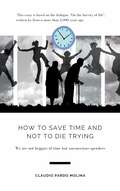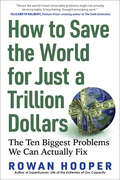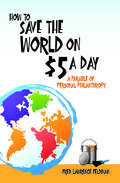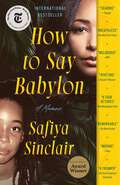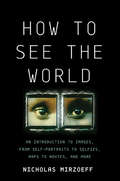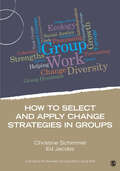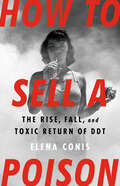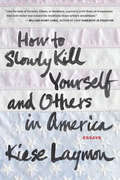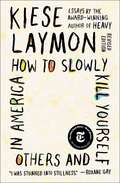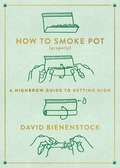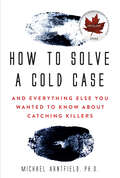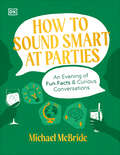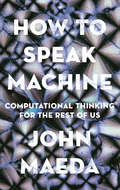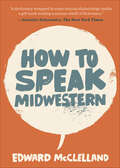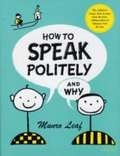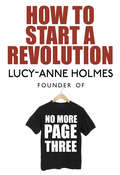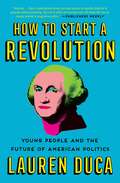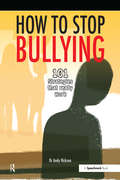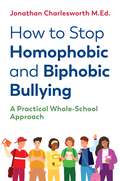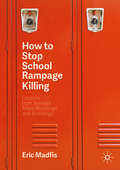- Table View
- List View
How to Restore a Timeline: On Violence and Memory
by Peter CounterA kaleidoscopic blend of personal essays and cultural criticism that explores the profound and occasionally horrific truths of what it means to be traumatized. When a stranger shoots his dad on a Costa Rican pier, Peter Counter hauls his blood-drenched father to safety. Returning home, Counter discovers that his sense of time and memory is shattered, and in its place is a budding new mental illness: post-traumatic stress disorder. Counter begins to see violence everywhere. From the music of Cat Stevens to Jeb Bush’s Twitter feed. Walter Benjamin to Johnny Carson. Taskmaster. Video games. ASMR videos on YouTube. The world is steeped in gore. Again and again, Counter finds himself reliving his father’s shooting as his trauma is fragmented, recast, and distorted on a compulsive mental tilt-a-whirl. Formally inventive and incisively smart, How to Restore a Timeline revels in a fragile human condition battered by real conflict and hyper-curated media portrayals of death. Channelling John Jerimiah Sullivan and Carmen Maria Machado, these essays look us dead in the eye and ask: What kind of life can we piece together amid all the carnage?
How to Romance the Man You Love--the Way He Wants You To!
by Lucy Sanna[From the book cover:] This is a book to help women to Rekindle their man's Passion for Passion. What are you waiting for? Flirt. Surprise him with a special gift, just because. Go on a date and leave the kids at home. Go for a drive and let him do all the talking. Say you'll tell him your most secret fantasy if he'll tell you his first. Enticing? Always. Romantic? Absolutely. And this is just the beginning.... Do you want romance? The answer is a resounding yes. But if you want specifics, you'll have to ask carefully. Because unless you do, most men are reluctant to open up and bare their souls. As a result, women have been forced to make assumptions and a lot of generalizations about what their partners did or didn't want. Until now. The author asked hundreds of men nationwide to share their deepest desires, their hidden fears, and their most enchanting romantic experiences. And they did, all in the name of love. The result is a delightfully empowering book that will leave you breathlessly awaiting your next romantic rendezvous. Full of activities designed to enhance your romantic spirit--and his--How to Romance the Man You Love is the key to opening doors you never dreamed existed! By reading this book, you're already showing him how much his absolute happiness means to you, which may be one of the most romantic things you'll ever do for him." Tastefully written. Check the Bookshare collection for the companion to this book: How to Romance the Woman you love--The Way She Wants You To.
How to Ruin a Queen: Marie Antoinette and the Diamond Necklace Affair
by Jonathan BeckmanA tale of greed, lust, deceit, theft on an extraordinary scale, charlatanry, kidnapping, assassination and escape from prison.
How to Sample in Surveys
by Dr Arlene G. FinkHow much is enough in your sample? What is the difference between a research question and a survey question? By exploring the answers to these questions, this book shows readers how to specify inclusion and exclusion criteria in a sample, select the appropriate probability and non-probability sampling methods, understand the sources of error in sampling, and calculate the response rate. New to this edition is coverage of sample size and power so that the reader can better understand the logic in determining the sample size to detect a difference if one exists. Filled with checklists and guidelines, this book will enable readers to select and use the most appropriate sampling methods for their survey. "Fink provides detailed descriptions of inclusion/exclusion criteria, the logic in estimating standard errors and sample size determination, and the sources of sampling errors." --Gerald Albaum, book review in Journal of Marketing Research
How to Save Time and Not to Die Trying
by Claudio Pardo MolinaThis essay is based on the dialogue, On the brevity of life", written by Lucio Anne Seneca in 55 A.D. I wrote this essay adapting Seneca's dialogue; due to its impressive validity being written more than 2,000 years ago. I believe that Seneca's recommendations, adapted to current examples, enabling many people to make better decisions with the most valuable asset we have, I am referring to our time. I am interested that together discovers the immense wisdom that comes to us from the past, and that could make us avoid so much suffering from the misuse of time. Reading is listening. I guess reading that type of document is like being able to listen to the human being's experiences with a more common sense he wanted to guide us a long time ago, and whom we were not lucky enough to meet in person.
How to Save the World for Just a Trillion Dollars: The Ten Biggest Problems We Can Actually Fix
by Rowan HooperWhat would you do with a trillion dollars? The ultimate thought experiment opens our eyes to ten world-changing ideas within our grasp If we can come up with a trillion dollars to bail out banks, imagine what else we could do. Science journalist Rowan Hooper decided to find out, speaking with experts of all kinds about ten incredibly ambitious projects that— if realized—would secure profound, enduring benefits: trying to end global poverty, reverse climate change, extend our lifespans, refreeze the Arctic, save all endangered species, and more. Then, he dives into strategies and costs to see: How far would $1 trillion really go? You’ll have to read on to learn which project he concludes would do the most good . . . but the biggest surprise is how many astonishing advances are actually within our grasp—if we dare to reach for them.
How to Save the World on $5 a Day
by Fred Lawrence FeldmanHow to Save the World on $5 a Day provides a fascinating, multi-cultural look at the history and traditions of charitable giving, and offers innovative instruction on the theory and practice of a new form of altruism dubbed personal philanthropy - all in the form of an inspirational novelette. Designed to be read in a single sitting, this "Parable of Personal Philanthropy" uses the unexpected meeting and burgeoning romance between a passionately committed social activist named Annette and a creatively blocked artist named John to explore how even modest charitable giving can lead to personal happiness...a reinvigorated sense of self-worth... and ultimately, spiritual enlightenment. The secret is not how much you give; it's how you give... It's not about amount. It's about intent... Caring not currency... Mindfulness not money... In colorful, cliffhanger chapters that advance the story of Annette and John...bring to life charitable fables from Catholicism, Judaism, Islam and Buddhism...and introduce the reader to innovative ways to vividly experience the mental and spiritual benefits of personal philanthropy, this book offers a marvelous glimpse of life as it can be with just a slight adjustment in our perceptions and attitudes. It sends a timely and important message of hope and possibility to a worldwide audience that yearns for diverse and creative approaches on how to experience personal enlightenmentand...How to Save the World on $5 a Day.
How to Say Babylon: A Memoir
by Safiya SinclairNational Book Critics Circle Award Winner A New York Times Notable Book A Read with Jenna Today Show Book Club Pick! A Best Book of 2023 by the New York Times, Time, The Washington Post, Vulture, Shelf Awareness, Goodreads, Esquire, The Atlantic, NPR, and Barack Obama With echoes of Educated and Born a Crime, How to Say Babylon is the stunning story of the author&’s struggle to break free of her rigid Rastafarian upbringing, ruled by her father&’s strict patriarchal views and repressive control of her childhood, to find her own voice as a woman and poet.Throughout her childhood, Safiya Sinclair&’s father, a volatile reggae musician and militant adherent to a strict sect of Rastafari, became obsessed with her purity, in particular, with the threat of what Rastas call Babylon, the immoral and corrupting influences of the Western world outside their home. He worried that womanhood would make Safiya and her sisters morally weak and impure, and believed a woman&’s highest virtue was her obedience. In an effort to keep Babylon outside the gate, he forbade almost everything. In place of pants, the women in her family were made to wear long skirts and dresses to cover their arms and legs, head wraps to cover their hair, no make-up, no jewelry, no opinions, no friends. Safiya&’s mother, while loyal to her father, nonetheless gave Safiya and her siblings the gift of books, including poetry, to which Safiya latched on for dear life. And as Safiya watched her mother struggle voicelessly for years under housework and the rigidity of her father&’s beliefs, she increasingly used her education as a sharp tool with which to find her voice and break free. Inevitably, with her rebellion comes clashes with her father, whose rage and paranoia explodes in increasing violence. As Safiya&’s voice grows, lyrically and poetically, a collision course is set between them. How to Say Babylon is Sinclair&’s reckoning with the culture that initially nourished but ultimately sought to silence her; it is her reckoning with patriarchy and tradition, and the legacy of colonialism in Jamaica. Rich in lyricism and language only a poet could evoke, How to Say Babylon is both a universal story of a woman finding her own power and a unique glimpse into a rarefied world we may know how to name, Rastafari, but one we know little about.
How to See the World: An Introduction to Images, from Self-Portraits to Selfies, Maps to Movies, and More
by Nicholas MirzoeffEvery two minutes, Americans alone take more photographs than were printed in the entire nineteenth century; every minute, people from around the world upload over 300 hours of video to YouTube; and in 2014, we took over one trillion photographs. From the funny memes that we send to our friends to the disturbing photographs we see in the news, we are consuming and producing images in quantities and ways that could never have been anticipated. In the process, we are producing a new worldview powered by changing demographics--one where the majority of people are young, urban, and globally connected. In How to See the World, visual culture expert Nicholas Mirzoeff offers a sweeping look at history’s most famous images--from Velázquez’s Las Meninas to the iconic "Blue Marble”--to contextualize and make sense of today’s visual world. Drawing on art history, sociology, semiotics, and everyday experience, he teaches us how to close read everything from astronaut selfies to Impressionist self-portraits, from Hitchcock films to videos taken by drones. Mirzoeff takes us on a journey through visual revolutions in the arts and sciences, from new mapping techniques in the seventeenth century to new painting styles in the eighteenth and the creation of film, photography, and x-rays in the nineteenth century. In today’s networked world, mobile technology and social media enable us to exercise "visual activism”--the practice of producing and circulating images to drive political and social change. Whether we are looking at pictures showing the effects of climate change on natural and urban landscapes or an fMRI scan demonstrating neurological addiction, Mirzoeff helps us to find meaning in what we see. A powerful and accessible introduction to this new visual culture, How to See the World reveals how images shape our lives, how we can harness their power for good, and why they matter to us all.
How to Select and Apply Change Strategies in Groups (Group Work Practice Kit)
by Christine Schimmel Ed JacobsLearn to develop key strategies and directly influence positive group culture This accessible book details the competencies, functions, and strategies that help members benefit from a positive group culture as they pursue their own learning. The authors demonstrate how group members and leaders learn and derive meaning from their group work experience. Drawing on the latest research on group work, this practical book also covers diversity and multicultural issues as well as accreditation or specialty standards. How to Select and Apply Change Strategies in Groups is part of the Group Work Practice Kit: Improving the Everyday Practice of Group Work, a collection of nine books each authored by scholars in the specific field of group work. To promote a consistent reading experience, the books in the collection conform to editor Robert K. Conyne’s outline. Designed to provide practitioners, instructors, students, and trainees with concrete direction for improving group work, the series provides thorough coverage of the entire span of group work practice. This book is endorsed by the Association for Specialists in Group Work.
How to Sell Out: The (Hidden) Cost of Being a Black Writer
by Chad SandersA timely, vulnerable, and cutting-edge exploration of the pressures and pitfalls of writing while Black in America in this urgently needed addition to the national conversation of race, money, and art.In the summer of 2020, when the nation was erupting in protest over the murder of George Floyd, Chad Sanders was quietly celebrating for selfish reasons. Why? After years of struggling to get his footing as a writer, he&’d finally landed a New York Times op-ed. He wrote an essay about the hollow messages of concern he&’d been receiving from white friends and colleagues. It went viral, and in the years that followed, he built a solid career as a creator—of books, podcasts, TV shows, and films—by mining his most painful experiences of being Black in America. Black pain for white money. For Sanders, this was a lucrative trade. One he thought he could work for the rest of his life. But it didn&’t take long for him to realize he, like so many other writers, was getting the short end of the stick. In How to Sell Out, Sanders draws on his personal experiences to offer a wry, darkly comic look at the invisible realities of making a living as a Black writer who writes about race. He relays stories of his time in the tech business, his experiences in TV writers&’ rooms, his childhood participation in Jack and Jill, his family and relationships, and the struggles of sharing his racial trauma in exchange for cash. Combining meditations on historical and current events and the intersection of race and class with short creative essays, Sanders sculpts a freewheeling arc that is as funny as it is moving and thought-provoking.
How to Sell a Poison: The Rise, Fall, and Toxic Return of DDT
by Elena ConisThe story of an infamous poison that left toxic bodies and decimated wildlife in its wake is also a cautionary tale about how corporations stoke the flames of science denialism for profit.The chemical compound DDT first earned fame during World War II by wiping out insects that caused disease and boosting Allied forces to victory. Americans granted it a hero&’s homecoming, spraying it on everything from crops and livestock to cupboards and curtains. Then, in 1972, it was banned in the US. But decades after that, a cry arose to demand its return. This is the sweeping narrative of generations of Americans who struggled to make sense of the notorious chemical&’s risks and benefits. Historian Elena Conis follows DDT from postwar farms, factories, and suburban enclaves to the floors of Congress and tony social clubs, where industry barons met with Madison Avenue brain trusts to figure out how to sell the idea that a little poison in our food and bodies was nothing to worry about.In an age of spreading misinformation on issues including pesticides, vaccines, and climate change, Conis shows that we need new ways of communicating about science—as a constantly evolving discipline, not an immutable collection of facts—before it&’s too late.
How to Slowly Kill Yourself and Others in America
by Kiese LaymonAuthor and essayist Kiese Laymon is one of the most unique, stirring, and powerful new voices in American social and cultural commentary. How to Slowly Kill Yourself and Others in America is a collection of Laymon's essays, touching on subjects ranging from family, race, violence, and celebrity to music, writing, and coming of age in the rural Mississippi Gulf Coast. Laymon's writing is unflinchingly honest, while also being smart, lacerating, and unexpectedly funny.In How to Slowly Kill Yourself and Others in America, Laymon deals in depth with his own personal story, which is filled with trials (and reflections on those trials) that illuminate under-appreciated aspects of contemporary American life. As revealed in the book's title essay, Laymon attended three colleges before earning his undergraduate degree. He was suspended from the first of these institutions, Millsaps College, following a probationary period resulting from a controversial essay he published on campus. As the school's president described it, the "Key Essay in question was written by Kiese Laymon, a controversial writer who consistently editorializes on race issues." Controversy seemed to follow this young writer, but as he himself puts it, "my job is to ask questions, to broaden the scope of American literature by broadening the scope of who is written to and imaginatively writes back."Laymon voice is something new and unexpected in contemporary American writing, mixing a colloquial voice with acerbic wit, sharp insights, and blast-furnace heat that calls to mind no one so much as a black 21st-century Mark Twain. Much like Twain, Laymon's writing is steeped in controversial issues both private and public. From his biting critiques of race politics to revelations of his own internal struggles with American "blackness," Laymon taps into an ongoing conversation that is played out consciously and subconsciously across all of our artistic, cultural, political, and economic realities.This collection introduces Laymon as a writer who balances volatile concepts on a razor's edge, and who chops up much-discussed and often-misunderstood topics with his scathing humor and fresh, unexpected takes on the ongoing absurdities, frivolities, and calamities of American life.
How to Slowly Kill Yourself and Others in America: Essays
by Kiese LaymonA New York Times Notable Book A revised collection with thirteen essays, including six new to this edition and seven from the original edition, by the &“star in the American literary firmament, with a voice that is courageous, honest, loving, and singularly beautiful&” (NPR).Brilliant and uncompromising, piercing and funny, How to Slowly Kill Yourself and Others in America is essential reading. This new edition of award-winning author Kiese Laymon&’s first work of nonfiction looks inward, drawing heavily on the author and his family&’s experiences, while simultaneously examining the world—Mississippi, the South, the United States—that has shaped their lives. With subjects that range from an interview with his mother to reflections on Ole Miss football, Outkast, and the labor of Black women, these thirteen insightful essays highlight Laymon&’s profound love of language and his artful rendering of experience, trumpeting why he is &“simply one of the most talented writers in America&” (New York magazine).
How to Smoke Pot (Properly): A Highbrow Guide to Getting High
by David BienenstockOnce literally demonized as "the Devil's lettuce," and linked to all manner of deviant behavior by the establishment's shameless anti-marijuana propaganda campaigns, cannabis sativa has lately been enjoying a long-overdue Renaissance. So now that the squares at long last seem ready to rethink pot's place in polite society, how, exactly, can members of this vibrant, innovative, life-affirming culture proudly and properly emerge from the underground--without forgetting our roots, or losing our cool?In How to Smoke Pot (Properly), VICE weed columnist and former High Times editor David Bienenstock charts the course for this bold, new, post-prohibition world. With plenty of stops along the way for "pro tips" from friends in high places, including cannabis celebrities and thought leaders of the marijuana movement, readers will learn everything from the basics of blazing, to how Mary Jane makes humans more creative and collaborative, nurtures empathy, catalyzes epiphanies, enhances life's pleasures, promotes meaningful social bonds, facilitates cross-cultural understanding, and offers a far safer alternative to both alcohol and many pharmaceutical drugs.You'll follow the herb's natural lifecycle from farm to pipe, explore cannabis customs, culture and travel, and discover how to best utilize and appreciate a plant that's at once a lifesaving medicine, an incredibly nutritious food, an amazingly useful industrial crop, and a truly renewable energy source. You'll even get funny and informative answers to burning questions ranging from: How can I land a legal pot job? to Should I eat a weed cookie before boarding the plane? In two-color, with charts and illustrations throughout, How to Smoke Pot (Properly) is truly a modern guide to this most revered herb. And remember, marijuana has the potential to help us live more meaningful, satisfying and authentic lives, and create safer, happier, more harmonious communities, but first we must learn to consume this miracle plant properly.From the Trade Paperback edition.
How to Solve a Cold Case: And Everything Else You Wanted To Know About Catching Killers
by Michael ArntfieldGet inside the mind of an elite cold case detective and learn how to solve a murder. Despite advances in DNA evidence and forensic analysis, almost half of murder cases in Canada and the US remain unsolved. By 2016, the solved rate had dropped so significantly in the United States that it was the lowest in recorded history, with one in two killers never even identified, much less arrested and successfully prosecuted. And the statistics are just as bad in Canada.As a sought-after global expert and former detective, Arntfield has devoted his career to helping solve cold cases and serial murders, including the creation of the Western University Cold Case Society, which pairs students with police detectives to help solve crimes. In How to Solve a Cold Case, Arntfield outlines the history of cold case squads in Canada and the US, and lays out the steps to understanding and solving crime. Arntfield shows you what to look for, how to avoid common mistakes, recognize patterns and discover what others have missed. Weaving in case studies of cold crimes from across Canada and the US, as well as a chapter on how armchair detectives can get involved, How to Solve a Cold Case is a must-read for mystery fans and true crime buffs everywhere.
How to Sound Smart at Parties: An Evening of Fun Facts & Curious Conversations
by Michael McBrideWelcome to the most interesting dinner party you&’ve ever attended!Join seven friends for an evening of trivia, myth-busting, and camaraderie. You'll have a front row seat at the party, listening in to the early small talk—where light and fun ideas are discussed (&“Did you know astronauts have Velcro on the inside of their helmets to scratch their noses?&”)—to the end of the night, when conversations get deeper. (&“Did the popularization of drinking coffee lead to modern democracies?&”)Packed with over 150 fun facts spanning the topics of ancient civilizations, animal behavior, natural science, outer space, human accomplishments, pop culture, and more, How to Sound Smart at Parties ensures you&’ll always have something clever to contribute to the conversation.
How to Speak Machine: Computational Thinking for the Rest of Us
by John MaedaVisionary designer and technologist John Maeda defines the fundamental laws of how computers think, and why you should care even if you aren't a programmer."Maeda is to design what Warren Buffett is to finance." --WiredJohn Maeda is one of the world's preeminent interdisciplinary thinkers on technology and design. In How to Speak Machine, he offers a set of simple laws that govern not only the computers of today, but the unimaginable machines of the future. Technology is already more powerful than we can comprehend, and getting more powerful at an exponential pace. Once set in motion, algorithms never tire. And when a program's size, speed, and tirelessness combine with its ability to learn and transform itself, the outcome can be unpredictable and dangerous. Take the seemingly instant transformation of Microsoft's chatbot Tay into a hate-spewing racist, or how crime-predicting algorithms reinforce racial bias.How to Speak Machine provides a coherent framework for today's product designers, business leaders, and policymakers to grasp this brave new world. Drawing on his wide-ranging experience from engineering to computer science to design, Maeda shows how businesses and individuals can identify opportunities afforded by technology to make world-changing and inclusive products--while avoiding the pitfalls inherent to the medium.
How to Speak Midwestern
by Edward McClelland&“A long-overdue study of the middle-American vernacular, and how that vernacular informs our identity . . . A regionally specific Urban Dictionary.&” —Inside Hook The Pittsburgh toilet. Squeaky cheese. City chicken. Shampoo Banana. Chevy in the Hole. These are all phrases that are familiar to Midwesterners, but foreign to anyone living outside the region. Find out what they mean in How to Speak Midwestern. Edward McClelland will not only explain what Midwesterners say, but how and why they say it. He examines the causes of the Northern Cities Vowel Shift, one of the most significant changes in English pronunciation in a thousand years; explains why the accents in Fargo miss the nasality that&’s a hallmark of Minnesota speech; and reveals why Chicagoans talk more like people from Buffalo than their next-door neighbors in Wisconsin. For outsiders, McClelland will include helpful information such as &“How to Talk Through Your Nose,&” &“How to Mispronounce Foreign Place Names,&” and &“&‘Well, That&’s Different&’: How to Passive-Aggressively Criticize People, Places and Things.&” If you&’re from the Midwest, you&’ll have a better understanding of why you talk the way you do. If you&’re not, well, you&’ll know exactly what to say the next time someone ends a sentence with &“eh?&” &“How to Speak Midwestern is a fascinating read, whether you hail from WOWOland, the UP, Cereal City, or Baja Minnesota.&” —Chicagoist &“A dictionary wrapped in some serious dialectology inside a gift book trailing a serious whiff of Relevance.&” —The New York Times
How to Speak Politely and Why
by Munro LeafThis children's book concisely explains which forms of grammar are the correct ones to use, and why.
How to Start a Revolution
by Lucy-Anne HolmesA bite-sized guide to making change happen and the story behind the No More Page 3 campaign, written by its founder. Change doesn’t just happen. It starts with the idea that something could be different, could be better. It starts with a person who is brave enough to stand up and say, ‘Stop.’ This is what Lucy-Anne Holmes did when she wrote a letter to the editor of The Sun asking him to stop printing pictures of topless women on Page 3 of the paper. This was something that had been happening for forty five years but which - she suddenly realised - she found outdated and inappropriate and, after thinking about it, not unrelated to a lot of the bad things that happen to women. Launching a digital campaign, starting an online petition and recruiting a team of like-minded people, Lucy-Anne started a revolution. Hundreds of thousands of people signed the petition, wore the campaign t-shirt and dared to say #NoMorePage3. Lucy-Anne had never campaigned on anything before. She wasn't particularly political. She'd never been confrontational. But she found that you only need one thing to start a campaign - and it isn't cash, experience or even a thick skin. It's passion.If you have a desire to change something, read what Lucy-Anne has to say. She’s been there, done that, worn the t-shirt and come out the other side having made a difference in the world.
How to Start a Revolution: Young People and the Future of American Politics
by Lauren DucaTeen Vogue award-winning columnist Lauren Duca shares a smart and funny guide for challenging the status quo in a much-needed reminder that young people are the ones who will change the world.A columnist at Teen Vogue, Lauren Duca has become a fresh and authoritative voice on the experience of millennials in today’s society. In these pages she explores the post-Trump political awakening and lays the groundwork for a re-democratizing moment as it might be built out of the untapped potential of young people. Duca investigates and explains the issues at the root of our ailing political system and reimagines what an equitable democracy would look like. It begins with young people getting involved. People like Alexandria Ocasio-Cortez, the youngest woman ever to be elected to Congress; David and Lauren Hogg, two survivors of the Parkland, Florida shooting who went on to become advocates for gun control; Amanda Litman, who founded the nonprofit organization Run For Something, to assist progressive young people in down ballot elections; and many more. Called “the millennial feminist warrior queen of social media” by Ariel Levy and “a national newsmaker” by The New York Times, Dan Rather agrees “we need fresh, intelligent, and creative voices—like Lauren’s—now as much—perhaps more—than ever before.” Here, Duca combines extensive research and first-person reporting to track her generation’s shift from political alienation to political participation. Throughout, she also draws on her own story as a young woman catapulted to the front lines of the political conversation (all while figuring out how to deal with her Trump-supporting parents).
How to Stop Bullying: 101 Strategies That Really Work
by Andy HicksonThis book includes 101 tried-and-tested strategies to deal with bullying. This is a practical workbook full of information and ideas on how to stop being bullied. It contains 101 ideas grouped into five sections: practical and everyday ideas; longer term ideas; cyberbullying; fun ideas; and advanced techniques. In addition, there is information on creating and updating an anti-bullying policy, warm-up games and activities for groupwork, as well as stories of bullying and their resolutions. This is an extremely useful resource for people who get bullied, teachers, health care professionals and parents. Suitable for all ages. Andy Hickson is Director of Actionwork UK. Andy is a theatre Director and has had shows performed at the Globe, Sadlers Wells, Norwich Playhouse and many venues abroad. Andy specialises in using creative action methods to explore violence and other issues. Andy is also a filmmaker and was a runner-up in the 2008 Motorola film competition. Writing credits include Creative Action Methods in Groupwork which is translated into Polish and Japanese, and The Groupwork Manual (also published by Speechmark) and numerous articles and chapters. Andy is currently finishing off his PhD in education.
How to Stop Homophobic and Biphobic Bullying: A Practical Whole-School Approach
by Jonathan CharlesworthThis vital teachers' guide to challenging homophobic and biphobic bullying offers unique insights to address the issue at its core. With a renewed focus on a whole school approach, it builds capacity in those who work with young people and inspires an inclusive approach in every setting. Laying out clear advice on how to recognise, stop and prevent homophobic and biphobic bullying, readers are given strategies to work with its perpetrators, bystanders and targets. The author explains how to handle disclosures regarding sexual orientation and provides advice on effective Anti-Bullying Policy referencing homophobic and biphobic bullying. Based upon the work of the UK's leading and award-winning LGBT+ anti-bullying charity Educational Action Challenging Homophobia (EACH) this book additionally explores why young people are too often reluctant to report these forms of bullying; the increasing role of the online environment and the profound impacts bullying can have well into adulthood. Written by an expert in this field, this essential guide is for teachers, youth workers, the care sector and anyone with a duty of care towards young people.
How to Stop School Rampage Killing: Lessons from Averted Mass Shootings and Bombings
by Eric MadfisThis book tackles the important question of how we can understand and learn from the school rampage killings that have been prevented. In the flood of recent accounts and analyses of deadly school rampage killings that plague society and inspire widespread public fear, very little attention has been given to the incidents that almost were. Building on Madfis’ previous book, The Risk of School Rampage: Assessing and Preventing Threats of School Violence (2014), this vital work addresses key gaps in school violence scholarship through the examination of averted school rampage incidents in the United States and advances existing knowledge through ground-breaking insights from the latest research on mass murder, violence prevention, bystander intervention, disciplinary policy, and threat assessment in school contexts. This empirical study utilizes in-depth interviews conducted with school and police officials (administrators, counselors, security guards, police officers, and teachers) directly involved in averting potential school rampages to explore the processes by which threats are assessed and school rampage plots are thwarted. Madfis finds that many common contemporary school violence prevention policies and practices are ineffective at preventing rampage attacks and may actually increase the likelihood of their occurrence. Rather than uncritically adopting such problematic approaches, Madfis argues that schools must model prevention practices upon what has proven successful in averting potentially deadly incidents.
